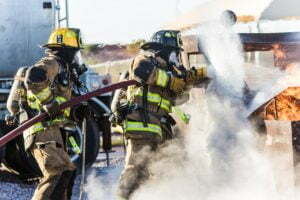Since the start of 2022, New York City has had a string of serious fires in various apartment buildings and housing complexes throughout the five boroughs. In fact, the Department of Investigation has opened an inquiry into whether a pattern of maintenance problems has contributed to recent fires at public housing developments in the City. While the recent spike in fires in New York may be an exception to the norm, winter is generally the most common time for house and apartment fires to occur. If you have been affected by an apartment fire caused by maintenance problems or general negligence, you might be able to recoup legal compensation.

Types of Apartment Fires
House fires are a significant fear for most individuals, but the risk and associated stress are even more heightened for those residing in multi-unit complexes. In these types of living situations, fires can cause extensive damage to numerous units beyond where the fire began, risking the safety of potentially dozens of people who are in no way associated with the fire’s origin. If there has been a fire in your apartment building or housing complex, it’s important to understand the various causes of apartment fires and who might be legally responsible.
Tenant Negligence
Some fires can be the result of tenant behavior. Factors that can cause house fires in tenant negligence situations include:
- Portable space heaters
- Faulty electrical equipment
- Cooking and cooking equipment mishaps
- Smoking indoors
- Unattended candles
- Faulty wiring
- Old or faulty appliances
- Faulty lighting
In these cases, the tenant whose actions caused the fire could be held liable. Should the neighbor have fire insurance, it might pay for damage to surrounding apartments, likely covering losses and damage from the fire and/or smoke. However, if the insurance company does not properly compensate your losses or denies coverage for your damaged personal belongings, you might need legal assistance. In this case, contact a skilled and experienced litigation attorney, such as those of us at Sullivan Papain, to help you recoup what is yours.
Landlord Negligence
In addition to fires caused by tenant negligence, fires and subsequent damage can be the result of landlord negligence. Negligence is defined as a failure to use reasonable care, resulting in damage or injury to another; negligence can be an action, or a failure to act that leads to harm. Apartment managers and landlords are responsible for various duties to prevent fires and subsequent damage. Should they not meet these duties, the landlord and/or manager may be held liable for any resulting damage, injury, or death.
Below are common causes of building fires that can be the result of landlord negligence:
- Faulty wiring
- Building code violations
- Lack of smoke detectors
- Defective smoke detectors
- Lack of fire alarms
- Lack of fire extinguishers
- Overcrowding
- Heating equipment
- Blocked fire exits
- Lack of fire exits
- Old or faulty appliances
- Old or faulty lighting fixtures
- Gas leaks
- Lack of self-closing doors
The duty of reasonable care that landlords owe tenants means that landlords have an obligation to take reasonable precautions to avoid a fire, and to comply with all ordinances, codes, and regulations that are in place to prevent the threat of a fire. If there is evidence of a landlord’s violation of these duties, they would be liable for damages, losses, injuries, or fatalities as a result of the fire.
Faulty Wires
As mentioned above, faulty wiring is a common cause of fires in apartment complexes—but it’s one that landlords are responsible for preventing. Faulty wiring can occur as a result of building age, damage from rodents or insects, shoddy installation, or electrical system overloads. In any of these situations, the landlord or property owner may be found responsible for updating or maintaining the electrical wiring. Should they fail to do so, they may be held liable for any of the damage that comes as a result of a fire.
Collectible Damages
Damages refers to monetary compensation awarded for harm suffered by the claimant due to negligent, reckless, or intentional actions of the liable party—in this case, the landlord or property manager. If you are able to make a successful claim against your landlord or property manager, there are various types of damages that you could potentially collect depending on your case. See the list below to learn more about various types of damages to pursue:
Compensatory Damages
Compensatory damages are awarded as compensation for damages, injury, or loss to the person injured.
Punitive Damages
Punitive damages are awarded in addition to actual damages as punishment for intentional behavior that is considered especially harmful.
Special Damages
Special damages are awarded for out-of-pocket expenses that can be determined by adding together the plaintiff’s quantifiable financial losses.
Nominal Damages
Nominal damages are awarded when the plaintiff is legally in the right, but has not suffered substantial losses.
How to Prove Your Case
To prove your case and successfully collect the damages you are pursuing, you as the tenant must prove that a landlord’s failure to fix a situation somehow led to harm, which can be difficult. With the legal counsel of an experienced attorney, you may be able to build a case that proves the landlord or building manager in question’s negligence and liability. Your claim will detail evidence of the duty breached by the landlord, and display the injury that came as a result. But for a successful case, choosing the right attorney is vital—and Sullivan Papain is actively taking negligence cases.
With our team of experienced and successful litigation attorneys, we’ll fight to get you the compensation you deserve. To speak to someone on Sullivan Papain’s team, call (212) 732-9000 or fill out the form below.
